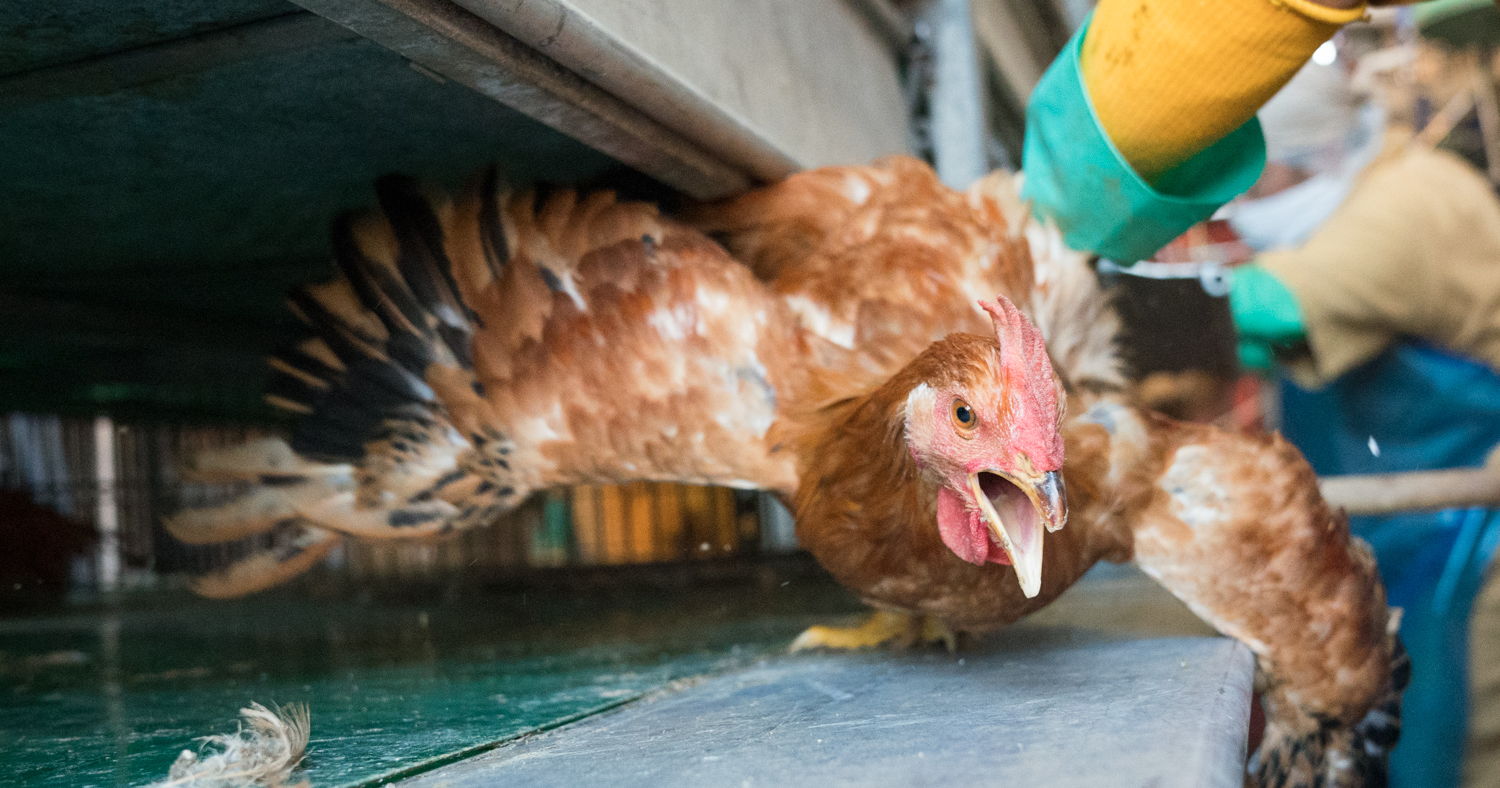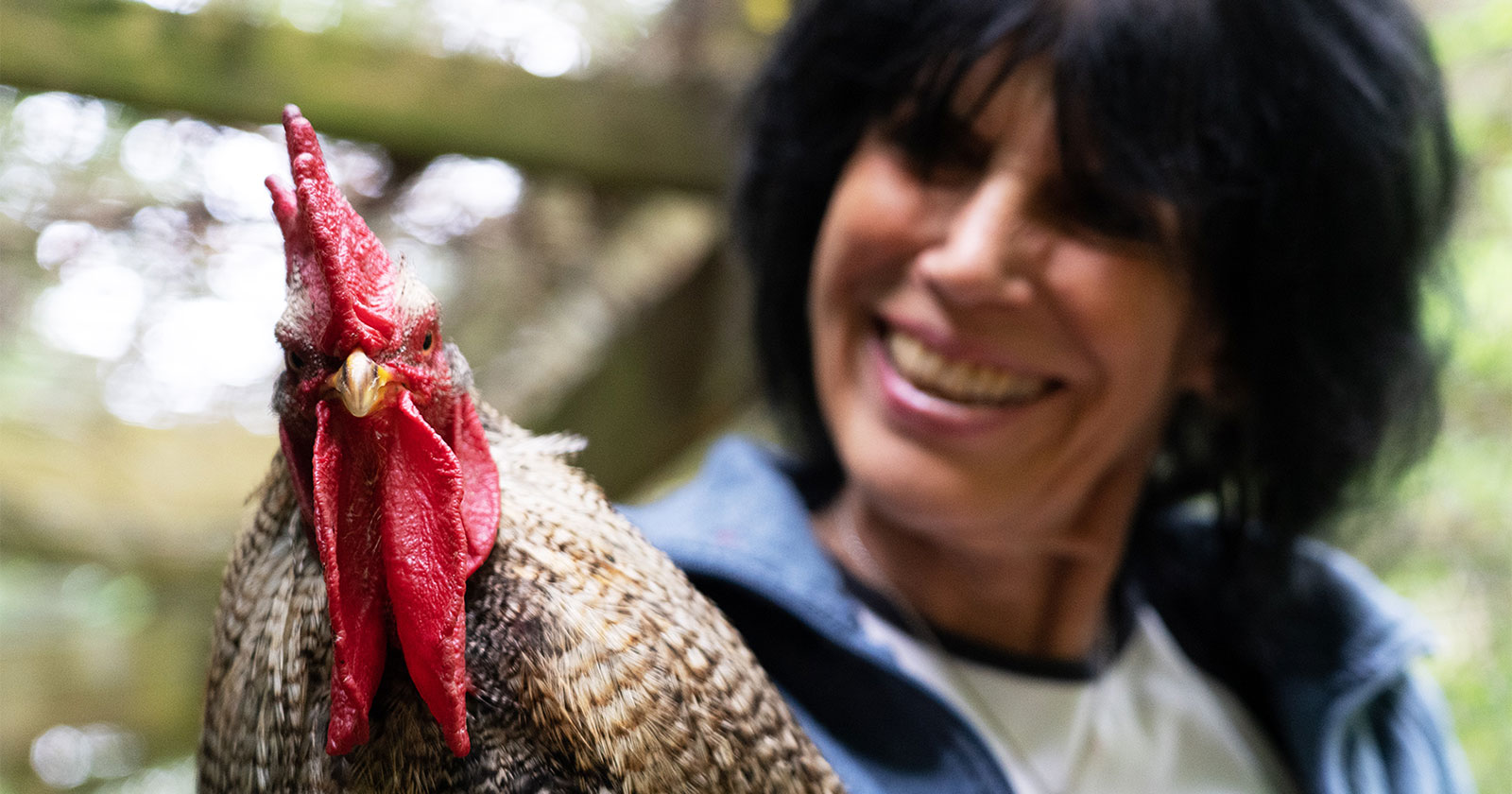“Dominance Through Mentioning”: The Fiction of Fair Coverage of Farmed Animals
Thinking Like a Chicken Podcast
News & Views!

Here’s a photo you are never likely to see in the mainstream media.
Photo by Unparalleled Suffering.
The media practice of ignoring, trivializing and demeaning farmed animals is well characterized by the phrase “Dominance Through Mentioning.” In Dominance Through Mentioning, disturbing truths and unorthodox viewpoints are “mentioned” so that the press can claim “balanced” coverage, but is it? Tune in to learn more.
Thinking Like a Chicken Overview
Transcript
“Dominance Through Mentioning”: The Fiction of Fair Coverage of Farmed Animals
Hello, and thank you for joining me today. I’m Karen Davis, the founder and president of United Poultry Concerns, a nonprofit organization that promotes compassion and respect for chickens, turkeys, ducks, and other domesticated birds.
Today I want to speak to you about a concept that I encountered while researching my book, More Than a Meal: The Turkey in History, Myth, Ritual, and Reality published in 2001. I was interested in how, and why, the news media routinely denigrated turkeys in their Thanksgiving coverage. Then as now, turkeys were treated in a demeaning and mocking manner. At the same time, starting in the mid-1980s, inserted into the standard coverage there would often be a Food or Lifestyle feature about rescued turkeys eating a meal instead of being the meal – a trend that was begun by Farm Sanctuary in the mid-1980s.
The media practice of ignoring, trivializing and demeaning farmed animals is a strategy that is well characterized by the phrase “Dominance Through Mentioning.” In Dominance Through Mentioning, disturbing truths and unorthodox viewpoints are “mentioned” so that the press can claim “balanced” coverage, without having to disturb the dominant worldview.
In particular, Dominance Through Mentioning is the attitude of the coverage toward the information presented that constitutes the “dominance.” Sociologist James Loewen in his book Lies My Teacher Told Me notes that his classroom students seldom or never recalled the European plague that destroyed the Native American town of Patuxet that enabled the Pilgrims to take over the town and rename it Plymouth (Massachusetts). He attributes the students’ ignorance to the fact that American textbooks have traditionally ignored the plague or buried it in a few bland phrases surrounded by glorification of the Pilgrims.
The strategy of Dominance Through Mentioning appeared in Canadian filmmaker John Kastner’s documentary Chickens are People Too, which aired on the Canadian Broadcasting Company’s weekly television show Witness on November 14, 2000. Kastner and his crew spent three days filming our chicken sanctuary here in Virginia, for the purpose of creating what Kastner called a “dialogue” between our perspective and sanctuary versus the point of view and violence of the poultry and egg industries. Hatchery operators, chicken farmers and chicken catchers freely acknowledge in the film their lack of compassion for the chickens.
Despite scenes of horrific cruelty to the chickens along with images of the chickens in our sanctuary, Kastner manipulated the “dialogue” by gorging on eggs and chicken parts in almost every scene. The show ends with him sitting in a tree with a bucket of fried chicken, listening in his head to our slogan, “Don’t just switch from beef to chicken – get the slaughterhouse out of your kitchen.” The shape of the show circles back to the beginning without any notable change of attitude or behavior in the investigator. His mockery dominates and surrounds the “mentioning” of the chickens.
In a review of Chickens are People Too, television critic Tony Atherton mimicked Kastner’s mocking tone. Kastner, he joked, “forces inveterate chicken eaters, like himself, to at least consider the sad life history of Sunday dinner before tucking in.”
Similar sarcasms dominate New York Times columnists Nicholas Kristof and Mark Bittman, who for years have devalued the suffering of chickens and other farmed animals revealed in the investigations they reported on. They adopt a dominantly playful narrative of how delicious eggs and meat are. How much “we” Americans love these things and how “our” taste buds transcend the cruelty shown in the investigations.
In 2007, 2015, and 2022-2023, articles about the avian influenza epidemic have ignored or totally underplayed the torture of millions of birds by the poultry and egg industries, focusing instead on the “suffering” of consumers deprived of the usual abundance of cheap eggs. Birds being agonized to death by agribusiness killing crews are falsely said to be “euthanized.”
Typically, an article in The Washington Post on January 10, 2023, titled "Egg prices haven't come down with inflation. Here's why," quotes an industry spokesperson on avian influenza, who says: “Infection slows a hen’s egg production if it doesn’t kill the bird first, and infected flocks are euthanized under practices approved by [the] American Veterinary Medical Association to avoid further spread.”
Violating the Veterinarian's Oath to “prevent and relieve animal suffering,” the AVMA does in fact approve suffocating and inflicting heatstroke on the hens and other unspeakable cruelties, while saying nothing about relieving the crowding, stress and filth that spread the disease. Nothing at all about ethics, compassion, or hygiene, except to call “discussions of ethics and morality . . . fruitless.”
Thus are the victims “mentioned” (“A hen’s egg production”) in a dominant narrative by corporate media siding with agribusiness to ensure public ignorance and apathy toward the brutal massacres, while hyping consumer distress over egg shortages. In 2015, chickens sickened by avian influenza were called by The New York Times the “live inventory”:” Farmers, we were told, were “forced to euthanize their own live inventory.”
Animal advocates are understandably happy when a Letter to the Editor or an Op-Ed focuses attention on the animals themselves, particularly in The New York Times, The Washington Post or The Wall Street Journal. While we are thankful for these additions and challenges to the dominant narrative, in terms of both information and attitude, we must understand that they are “mentionings” – inserted into coverage that overwhelmingly ignores and trivializes the animals and their experience. Unlike the “news,” they are “opinions.”
So, we may ask, what is the difference between an Op-Ed or a Letter to the Editor versus an opinion piece by a Nicholas Kristof or a Mark Bittman? The difference is between writers who are unaffiliated with the news organization in which their piece appears, and writers who are affiliated with the news organizations in which their piece appears. Affiliates like Bittman and Kristof are on the staff of The New York Times and are thus part of the Establishment, not mere guest columnists like you and me. The criteria for “Freedom of Speech” are thus, ironically, met by the corporate media, who thereby control the coverage that bypasses the animals while seeming to show “both sides.”
I hope you’ve enjoyed today’s podcast, and that you have found it informative and troubling. Please join me for the next podcast episode of “Thinking Like a Chicken – News & Views.” And have a wonderful day! Thank You!
KAREN DAVIS, PhD is the President and Founder of United Poultry Concerns, a nonprofit organization that promotes the compassionate and respectful treatment of domestic fowl including a sanctuary for chickens in Virginia. Inducted into the National Animal Rights Hall of Fame for Outstanding Contributions to Animal Liberation, Karen is the author of numerous books, essays, articles and campaigns. Her latest book is For the Birds: From Exploitation to Liberation: Essays on Chickens, Turkeys, and Other Domesticated Fowl published by Lantern Publications & Media.
Karen with Rainbow the rooster
Photo by Unparalleled Suffering Photography
